
Full paper available here:
www.researchgate.net/publication/...
@icedteas.bsky.social
Research scientist and Incoming post-doctoral fellow at the University of Chicago | Researching attitude moralization and political conflict

Full paper available here:
www.researchgate.net/publication/...
Anyway, a lot more in this paper, but a main takeaway:
Both parties bend democratic principles when it helps their side. But partisan asymmetries beyond that emerge around politicized issues like mail-in voting—not out of more stable differences in democratic values.
I shouldn't say partisan differences disappear… it's just that partisans on *both sides* oppose democratic violations less when it benefits their side, which is not ideal but not unexpected.
31.10.2025 16:18 — 👍 0 🔁 0 💬 1 📌 0
I find the latter.
When I test reactions to less politicized violations such as removing polling locations from opponent strongholds, the partisan differences disappear!
But are Republicans actually just more tolerant of limitations to voter access than Democrats? Or is this more about specific, politicized practices like vote-by-mail and voter ID laws?
31.10.2025 16:18 — 👍 0 🔁 0 💬 1 📌 0
For instance, I find that Republicans are less opposed to politically-driven limitations to vote-by-mail than Democrats are—even when the restriction hurts their own party.
Note: this holds even when using **perceived** (rather than manipulated) inparty benefit.
Some would argue that Republicans are more tolerant of limitations to voter access, even when such limitations could hurt them electorally. That is, they just care less about voter access in principle (or Democrats care more about it in principle)
31.10.2025 16:18 — 👍 0 🔁 0 💬 1 📌 0Across two experiments, both parties show the same basic pattern: they’re more accepting of norm violations when those violations benefit their side (shocking no one)
But there are important wrinkles in this tendency too

Really excited to share my first solo-authored article, out now in Personality and Social Psychology Bulletin!
I test when and why Democrats and Republicans differ in their tolerance for undemocratic actions.
🧵
New preprint with my grad advisee, Zeenat Ahmed. When and why do Americans prioritize party wins over democracy? Not because they don’t know what democracy is. Maybe, sometimes bc they don’t notice that in-partisans are violating democratic principles. There are some caveats. osf.io/preprints/os....
20.05.2025 15:02 — 👍 10 🔁 2 💬 2 📌 1

Officially a doctor, or PhDONE (I think is what they say). So grateful to @lindaskitka.bsky.social and all the help I've received these past few years!
04.02.2025 02:54 — 👍 26 🔁 3 💬 2 📌 1*Texas doctor & professor points out on tiktok that patients are not legally required to answer citizenship question in order to receive care
*Abbott threatens funding of hospital and university
*Video is removed
These overt threats by politicians to stifle speech becoming all too common.
Also confirmed that young participants is definitely a factor in antidemocratic endorsement in both datasets, but it doesn't nullify the effect of outparty warmth
24.11.2024 19:12 — 👍 0 🔁 0 💬 0 📌 0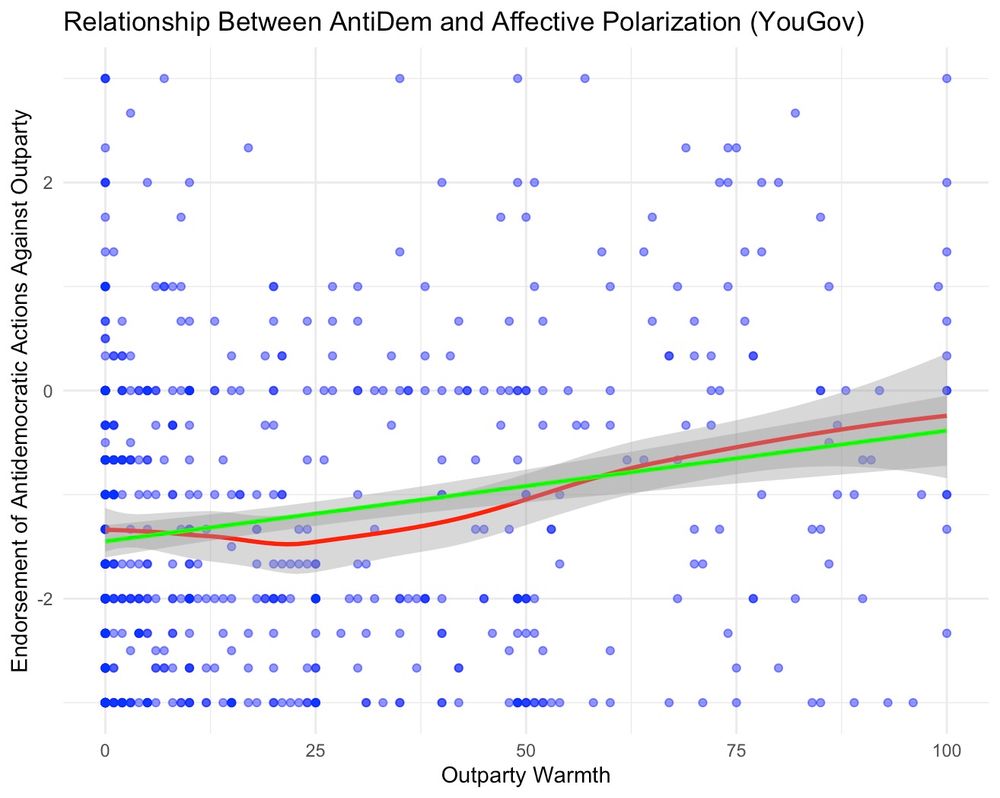

Of course, when graphing only outparty warmth, we get the weird relationship where the more you like the other party, the more willing you are to violate their democratic rights
24.11.2024 19:03 — 👍 0 🔁 0 💬 1 📌 0Thanks for posting this! Here are my graphs from a couple data sets configured like yours. I get a slight positive relationship in one and a negative relationship in another, but there is clearly that curvilinear pattern going on in both—though not quite the same as yours @derekholliday.com
24.11.2024 19:03 — 👍 2 🔁 0 💬 1 📌 0We've removed inattentive respondents through several rounds, so we're pretty confident that it's not that. I've also found this in a few datasets with different methods of cleaning, etc.
22.11.2024 23:00 — 👍 1 🔁 0 💬 0 📌 0It would be one thing if they were just anti-democratic actions in general, but the items ask about specific actions *against Republicans* so I can't see how liking Republicans more is associated with greater willingness to screw them over
22.11.2024 02:38 — 👍 0 🔁 0 💬 1 📌 0Yes, it appears in a couple of my data sets that the negative relationship between affective polarization and support for anti-democratic actions occurs for Democrats, but not really for Republicans.
21.11.2024 20:54 — 👍 0 🔁 0 💬 1 📌 0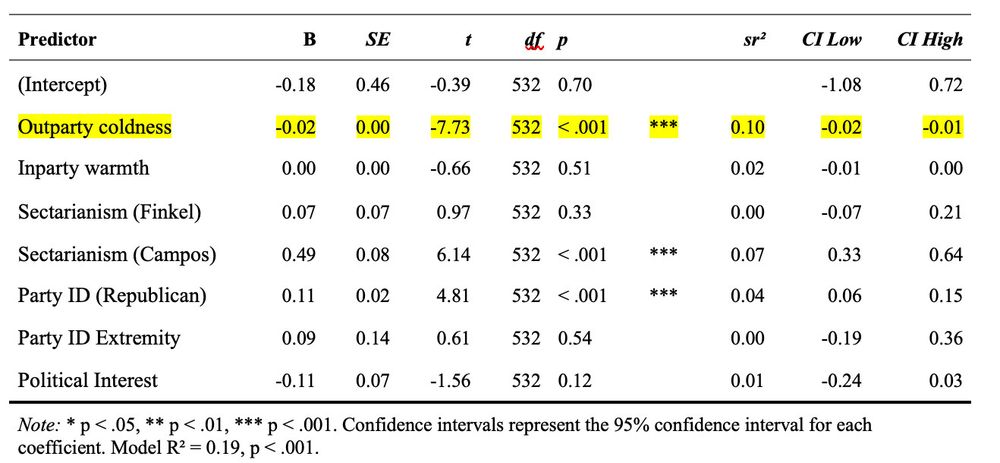
Thanks! Though I checked for that and political interest (extent to which one follows politics) didn't eliminate the effect
19.11.2024 19:11 — 👍 0 🔁 0 💬 1 📌 0Has anyone else found this? Is there a theoretical explanation I’m missing? Would love to hear your thoughts or related findings!
19.11.2024 16:17 — 👍 0 🔁 0 💬 3 📌 0This points to the need for better measures of affective polarization like political sectarianism—the moralized, toxic view of the other side. (come to my SPSP symposium about this!)
But still... why would colder feelings lead to less support for antidemocratic actions?
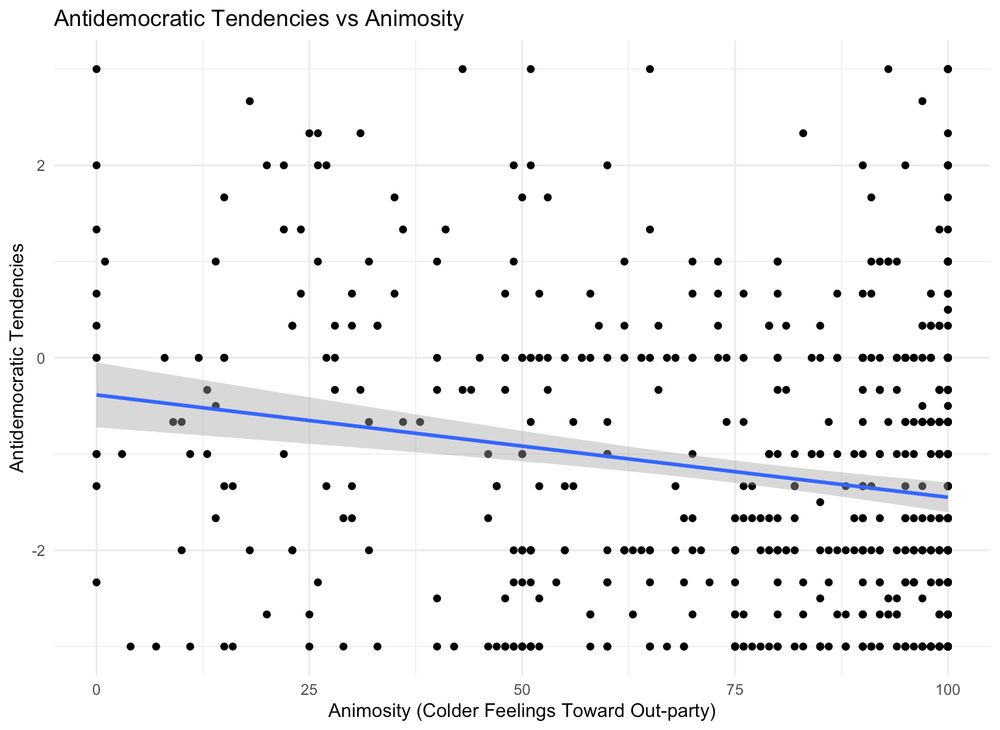
skewed, but negative relationship shown in a scatterplot between outparty coldness and antidemocratic tendencies
3️⃣ Could skew in the data explain it?
There’s definitely skew, but I find it hard to believe that it would fully account for the results.
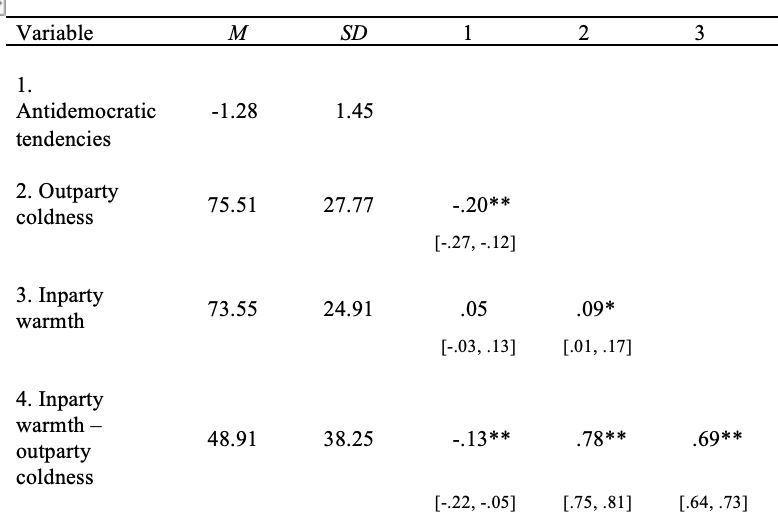
inparty warmth minus outparty coldness is still significantly negatively related to antidemocratic tendencies
2️⃣ Maybe it's because I'm not using a combination of inparty warmth minus outparty cold…coldness(?)..coldth(??)
Tried that too and found the same negative relationship!
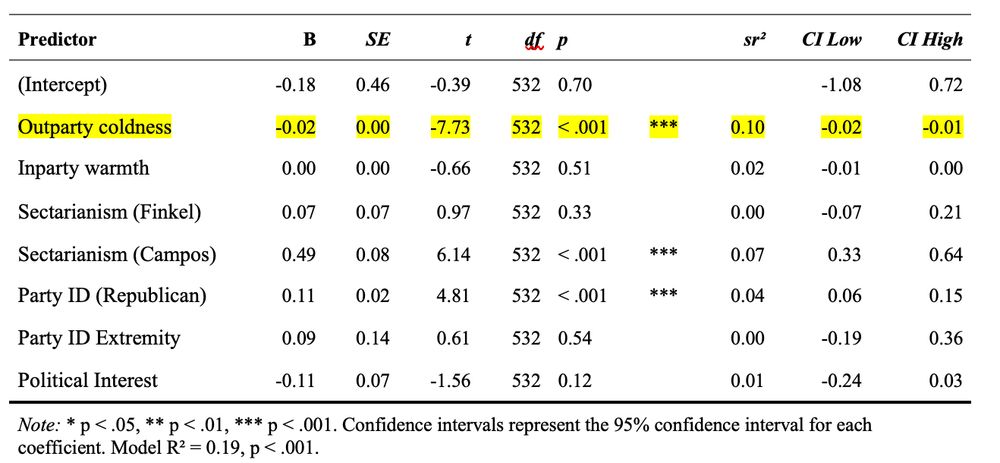
outparty coldness is still significant when accounting for political interest
Let’s look at some possible explanations (and rule them out):
1️⃣ Maybe people who are more polarized are also more politically conscious, which is related to more commitment to democratic norms?
Nah, I controlled for political interest and it does nothing.
I've seen this before in work by Campos & @cmfederico.bsky.social and @elijfinkel.bsky.social et al., especially when accounting for political sectarianism (othering + aversion + moralization). But I thought affective polarization was just unrelated, not negatively related!
19.11.2024 16:17 — 👍 0 🔁 0 💬 1 📌 0For context: Affective polarization (how much people dislike the opposing party) is often blamed for democratic backsliding. But in my data, it’s negatively related to support for antidemocratic actions. Isn’t that the opposite of what we’d expect?
19.11.2024 16:17 — 👍 0 🔁 0 💬 1 📌 0
correlation between antidemocratic tendencies and outparty coldness is -.20**
POLITICAL SCIENCE MYSTERY:
Why do partisans who feel colder toward the opposing political party seem LESS supportive of antidemocratic actions against them (e.g., closing polling stations)? Intuitively, dislike = more norm violations. What’s going on?🧵
This graph is showing % who said “mostly support.” Other response options were “mostly oppose” and “not sure.” Independents were more often “not sure” than other groups. They may have been more opposed than supportive of some but I don’t think that was often the case
12.06.2024 23:16 — 👍 2 🔁 0 💬 1 📌 0
Take a look at my article for more: today.yougov.com/politics/art...
(11/11)
Overall, the degree of support for different movements seems to be a pretty good reflection for who Americans perceive to be worth protecting, which has come to differ substantially by which political party you affiliate with. (10/11)
11.06.2024 15:27 — 👍 1 🔁 0 💬 1 📌 0